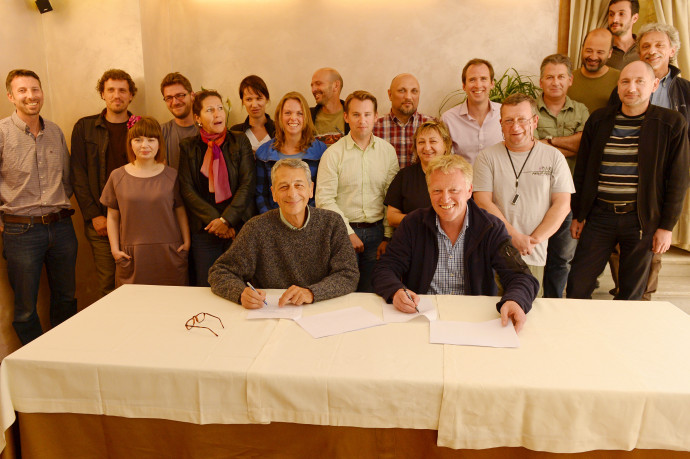Today, on World Environment Day, Rewilding Europe signed an agreement about joint practical efforts together with the Large Carnivore Initiative of Europe. The two organisations are going to work together over the coming years exploring pragmatic, practical ways to live side by side with these at times a bit difficult neighbours.

This is the main aim of a Memorandum of Understanding signed by both organisations today, during Rewilding Europe’s yearly Team meeting in Pescasseroli, Abruzzo National Park, Italy by Frans Schepers, Managing Director of Rewilding Europe and Professor Luigi Boitani, Chairman of the LCIE. There is also work underway between the organisations on a three-year Action Plan (2014-2016) connected to the Memorandum.
“We are both Pan-European initiatives, with a shared interest in restoring species and ecological functions, exploring new and positive perspectives, and demonstrating practical and pragmatic solutions”, says Frans Schepers, Managing Director of Rewilding Europe.
“The key word here is co-existence”, says Professor Luigi Boitani, Chairman of the Large Carnivore Initiative in Europe. “Without a compromise between the interests of humans and nature there will be no room for carnivores. Unfortunately today many of the standpoints in the debate about large carnivores is often value-laden and with little scientific basis. We would like to be part of adding the scientific knowledge dimension to this discussion.”
The large carnivore species in Europe just only survived the 19th and 20th centuries by a fine margin, and they are still absent from very large parts of their former ranges. Luckily, nowadays the trend for most of their populations have improved such that they are stable or increasing in many areas. Large carnivores are very important for the total biodiversity and for nature’s capacity to take care of itself. Therefore, carnivore populations and their habitats should be restored wherever that can be compatible also with human needs. For large carnivores to have a long-term future in our continent we have to allow them to spread and to reoccupy many of their former habitats – this also means to re-integrate them into landscapes where we humans live and work, as is already shown by many cases of human-carnivore co-existence throughout Europe. The continued urbanisation and changes of lifestyle in Europe, which is leading to widespread farmland abandonment and human exodus from the more marginal farm and grazing lands across the continent, is actually creating new possible space also for our large carnivores. The challenge we are facing is about how to best find pragmatic, practical ways to co-exist with these at times rather difficult neighbours. Many of the present conflicts between man and large carnivores can either be overcome or at least minimised.
Rewilding Europe and LCIE will work to together to help create, restore, enhance and maintain healthy populations of large carnivores across Europe. The focus for this work is on the selected rewilding areas: Central Apennines/Italy (brown bear & wolf), Danube Delta/Romania (wolf & golden jackal), Eastern Carpathians/Poland, Slovakia & Ukraine (brown bear, Eurasian lynx & wolf), Southern Carpathians/Romania (brown bear, Eurasian lynx & wolf), Velebit Mountains/Croatia (brown bear, Eurasian lynx, wolf & golden jackal), Western Iberia/Portugal & Spain (Iberian lynx (potentially) & wolf). This work is intended to expand also to the future new rewilding areas, with the candidates Greater Laponia/Sweden & Norway (brown bear, Eurasian lynx, wolf (potentially) & wolverine), Oder Delta/Germany & Poland (wolf), Rhodope Mountains/Bulgaria & Greece (brown bear, golden jackal & wolf). The time horizon that both organisations agree to in their joint vision is 2022. They will work on attitudes of the general public towards these species to become much more positive, and on increasing the number of rural communities and landowners who begin to see large carnivores more as a valuable asset than an obstacle to development. One goal is for large carnivores to increasingly become important attractions for tourism development in Europe, attracting investment from both public and private sectors for wildlife-oriented business development.
Rewilding Europe and LCIE will collaborate at a pan-European level, sharing their knowledge and conservation experience, led by a common interest in exploring how carnivory and herbivory can provide key ecological functions in healthy ecosystems and how the conservation of large carnivores and large herbivores has the potential to protect and restore European biodiversity. Both organisations have a shared interest to explore new avenues when it comes to how to create a more positive perspective on large carnivores in Europe, especially in the context of rural communities, and to demonstrate and showcase practical and positive solutions to the conservation challenges posed by these large carnivores, by also carrying out work in the field together.
Both organisations will collaborate within the framework of the “EU Platform on Large Carnivores”. According to the soon to be agreed Action Plan, LCIE will also participate in the Rewilding Europe Science Research Network, where currently seven European universities work on a rewilding research agenda. Another cooperation point is around Europe-wide communications.
Founded in 1996, The Large Carnivore Initiative of Europe has since 4 years had the official status of a Specialist Group within the Species Survival Commission (SSC) of the International Union for the Conservation of Nature (IUCN). The LCIE consists of a group of experts who give their time to help conserve large carnivores in Europe. Its members bring experience from the fields of research on ecological and human-dimensions, wildlife management, hands-on conservation, and from international conservation organisations. These members do not represent their institutions when working for the LCIE, thereby ensuring their independence. Currently, LCIE consists of a network of 40 expert members from 26 European countries, plus Canada. LCIE in 2013 created a Manifesto about the Large Carnivores (downloadable here), and this has now been adopted by Rewilding Europe as a main guideline for its work on carnivore issues.
The joint goal is to help create, restore, enhance or maintain healthy large carnivore populations across Europe.
